Teenager Loses It After She Witnesses Her Toddler Cousin Strangling Her Dog With A Rope
Teaching toddlers respect for animals has always been an important part of parenting, and there's no better time to start than when your little ones are still young. While the idea of teaching a toddler something as complex as respect can sound daunting, it is actually surprisingly easy!
By making simple and fun activities part of your child's routine, such as petting animals carefully or doing coloring pages with animal themes, you can plant the seeds of kindness that will blossom into lifelong habits. Teaching children to respect animals not only allows them to appreciate our planet more but also helps them form stronger personal connections with their furry friends.
Sadly, not all parents teach this value to their children. When kids have no respect for these creatures, they either get into trouble, or someone else's pet gets hurt.
A female teenager, who admits that she isn't good with human relationships and prefers the company of animals, talked about the cruelty she witnessed. The original poster (OP) asked the "Am I The A**hole?" (AITA) subreddit if she was wrong for yelling at her toddler cousin who strangled her dog using a rope.
After yelling at the little one, her aunt showed up at the door and started yelling at her for what she did. Let's look at the Redditors' take on this situation.
The OP witnessed something horrible.
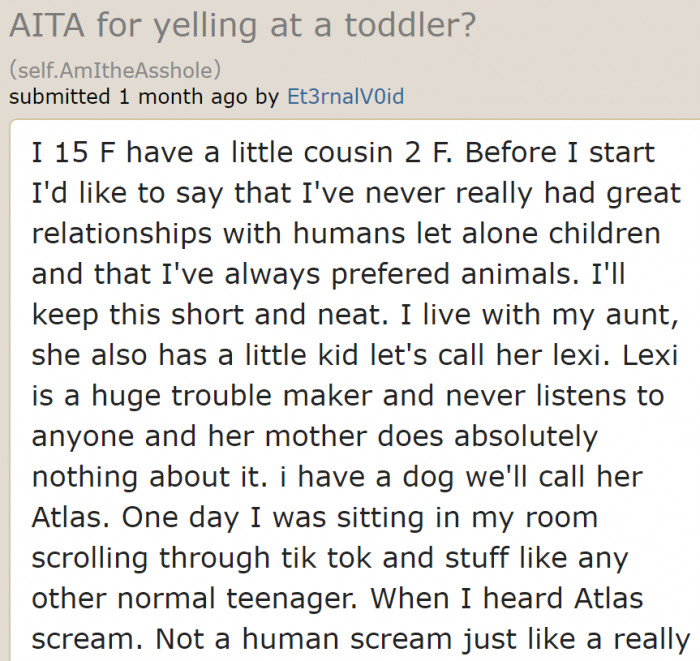
The dog fainted after getting strangled by the toddler. So the OP yelled at her cousin.
Was she wrong for doing this? She asks the community.

A Redditor thinks that everyone was at fault.
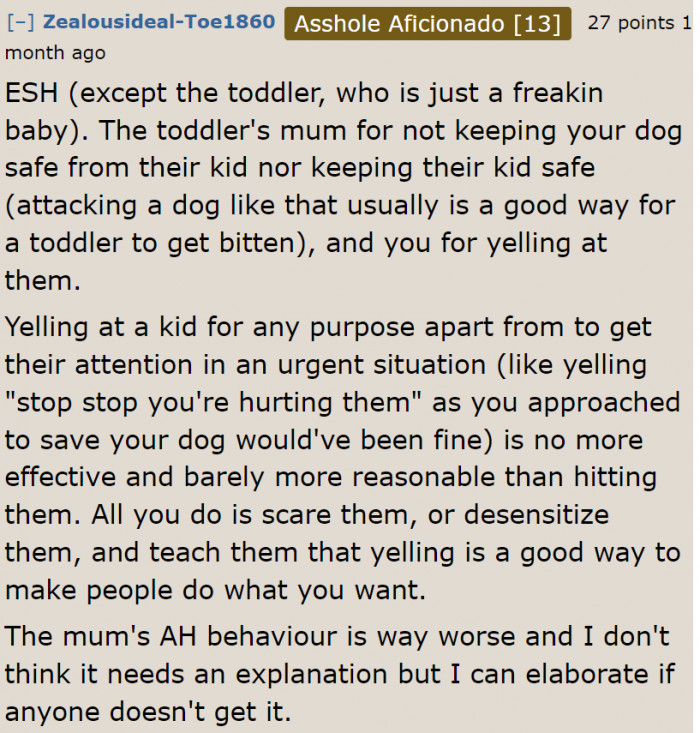
Child Behavior and Emotional Responses
This incident with the toddler highlights the critical role of adult supervision in child behavior, particularly around animals. Dr. Rachel Adams, a child psychologist, emphasizes that young children often lack the understanding of appropriate animal behavior, which can lead to dangerous situations.
Her research suggests that children need guidance and education about empathy toward animals to foster healthy interactions.
Understanding Child Behavior and Emotional Responses
Children often express their emotions through play and interaction, which can sometimes lead to concerning behaviors. According to Dr. Anna Freud, a pioneer in child psychology, children's actions, such as the incident described, can reflect their understanding of boundaries and emotional regulation.
This is particularly crucial in situations where they are exposed to pets, as they may not fully grasp the consequences of their actions.
This user isn't fond of kids.

Kids have zero maturity; that's why they do crazy things.

Toddlers don't have a sense of danger yet.

According to findings published in the Journal of Child Development, children learn through observation and modeling. When adults react strongly to a child's inappropriate behavior, it can create confusion and fear rather than teach them how to interact safely with animals.
This underscores the importance of using teachable moments to educate rather than reprimand.
Research in the Journal of Child Psychology indicates that children learn about empathy and emotional responses primarily through modeling behaviors from adults. When adults respond to children's actions with understanding rather than punishment, it fosters emotional intelligence and appropriate social behaviors.
Addressing these incidents with care can promote healthier interactions in the future.
Yelling isn't the best approach to this toddler.
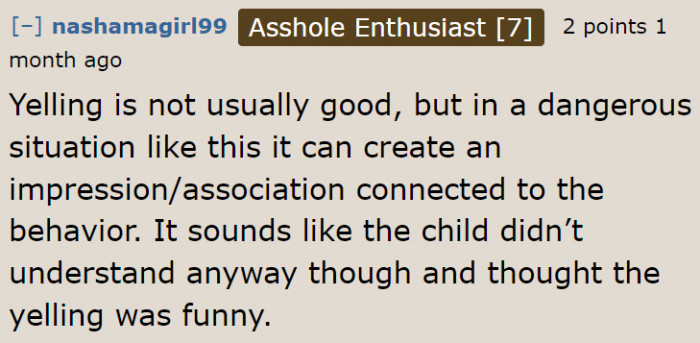
The mom needs to stop this behavior.
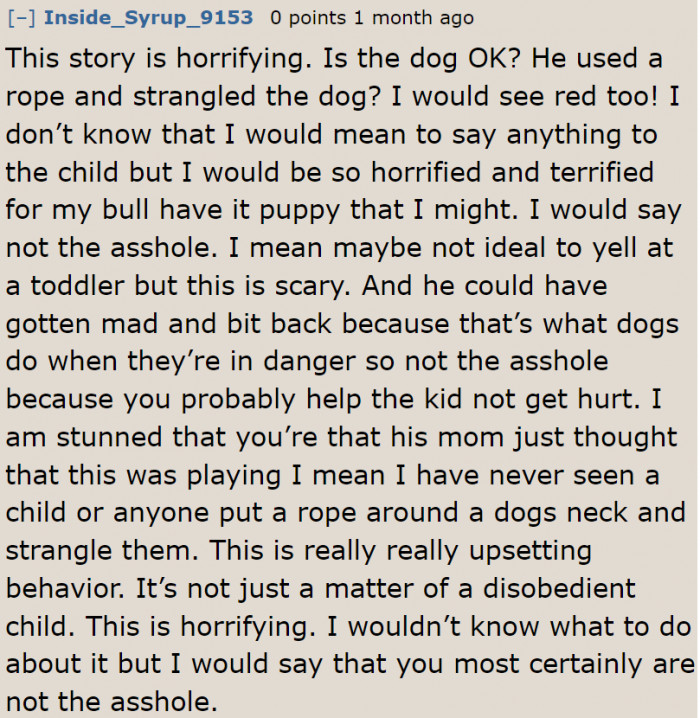
Even at a young age, children need to be taught to respect animals.
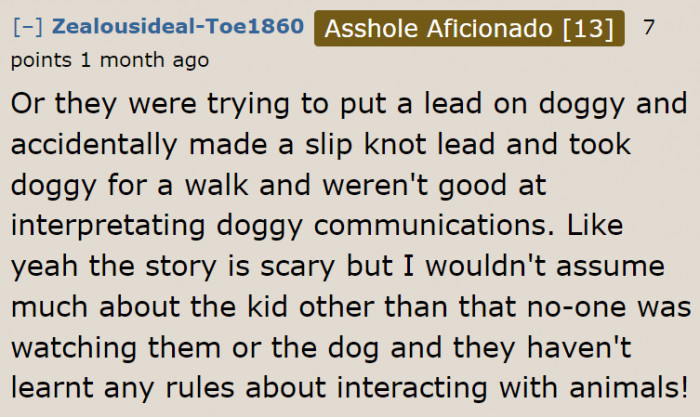
The Importance of Supervised Play
Experts recommend that caregivers actively supervise interactions between children and pets to ensure safety. Creating structured playtime that emphasizes gentle handling of animals can help children learn appropriate behaviors while fostering a love for pets.
Dr. John Bowlby, an attachment theorist, found that secure attachments help children learn empathy, which can be cultivated through positive experiences with animals.
The Importance of Adult Guidance in Child Development
Adults play a crucial role in guiding children's understanding of appropriate behavior. Psychologists suggest that positive reinforcement and gentle correction can help children learn about boundaries and empathy effectively.
Open discussions about feelings and consequences can foster a deeper understanding of their actions and promote emotional growth.
The OP came at the right time. It could've been worse.

The kid hasn't learned empathy.
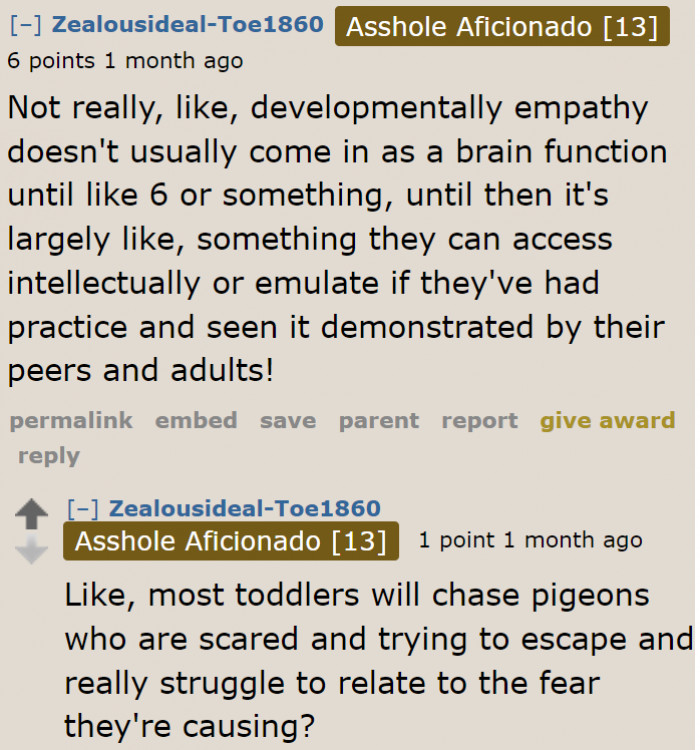
The mom is responsible too. She can't allow her daughter to hurt animals like this.
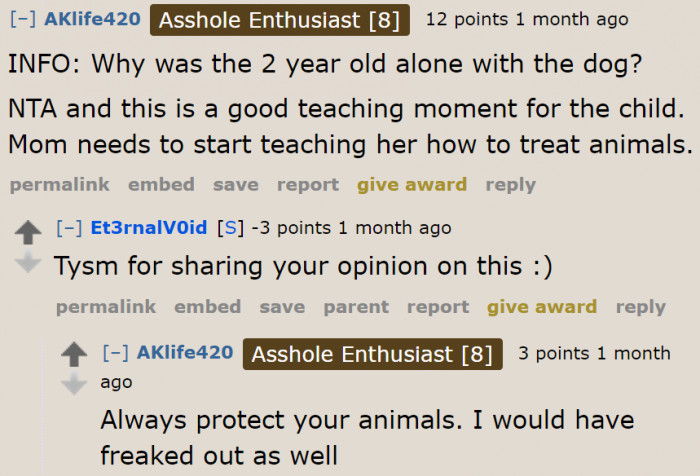
To foster better understanding, families might consider implementing family activities centered around animal care, teaching children how to respect and care for pets. Discussing the importance of empathy and kindness can also help children internalize these values, reducing the likelihood of harmful interactions.
Encouraging children to express their feelings about animals and discussing the consequences of their actions can promote emotional growth and responsibility.
Addressing concerning behaviors in children requires a compassionate approach. Research indicates that when parents and caregivers model empathy, children are more likely to adopt similar behaviors in their interactions with others.
Encouraging discussions about feelings can help children learn to articulate their emotions and understand the impact of their actions on others.
This isn't looking good for the OP.

Children this young shouldn't be left unsupervised.

Someone needs to watch over the kid next time.

Navigating Family Relationships and Emotional Education
Creating a supportive family environment is essential for teaching children about emotional regulation. Engaging in family activities that promote communication and empathy can help foster a sense of safety and understanding.
Regular family discussions about feelings can enhance emotional intelligence and improve family dynamics overall.
If only the OP can rely on other adults.
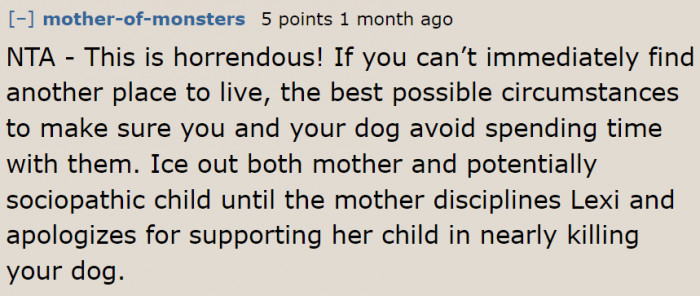
The OP needs to watch over her dog to keep this from happening again.


Ultimately, addressing children's behavior involves recognizing the underlying emotional needs driving their actions. By providing a safe space for children to express themselves, adults can encourage healthier emotional development.
Research from the Journal of Family Psychology emphasizes the importance of nurturing emotional intelligence during childhood.
The kid needs guidance. Sadly, her mom doesn't care.

Two-year-old children don't have empathy yet.
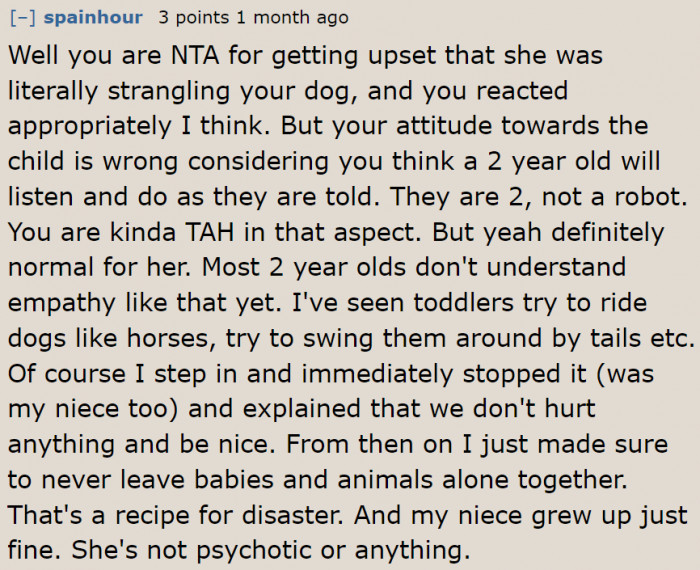
Why isn't the mom concerned about this behavior? She should start correcting it while her daughter is young.

The Role of Empathy in Child Development
Empathy is a critical component of healthy child development. Children who are taught to understand and respond to the feelings of others tend to develop stronger social skills and healthier relationships.
Psychologists recommend employing storytelling and role-playing as tools to teach empathy and emotional awareness.
If the OP can't do something about her cousin and her aunt, it's best to focus on things she has control over. For instance, she can keep the dog away from the cousin or allow her to play with the dog under supervision.
If her aunt won't teach her cousin how to handle animals, maybe it's time she teaches her cousin the importance of respect for these creatures.
In conclusion, nurturing emotional intelligence in children is essential for fostering healthy relationships. By approaching concerning behaviors with empathy and understanding, caregivers can promote emotional growth and well-being.
As noted in research from the Journal of Developmental Psychology, supportive family environments play a crucial role in shaping children's emotional responses and social skills.
Psychological Analysis
This situation highlights the importance of adult guidance in shaping children's understanding of appropriate behavior. It's crucial to approach these incidents with empathy and education to help children learn from their actions.
Encouraging open discussions about feelings can promote healthier emotional development.
Analysis generated by AI
Analysis & Alternative Approaches
Understanding children's emotional responses is vital for fostering healthy development and family dynamics. By prioritizing empathy and open communication, caregivers can help children navigate their emotions more effectively.
As psychologists emphasize, nurturing emotional intelligence during childhood is key to building strong, empathetic relationships in the future.
Analysis & Alternative Approaches
In summary, fostering safe interactions between children and pets requires adult guidance and education. Dr. Janet Lansbury, a renowned parenting expert, states, "Teaching children empathy towards animals is crucial for their emotional development" (janetlansbury.com). Research in child development emphasizes the importance of teaching empathy and appropriate behavior toward animals. Ultimately, it’s about creating a nurturing environment where children can learn to respect and understand animals, leading to healthier relationships.



